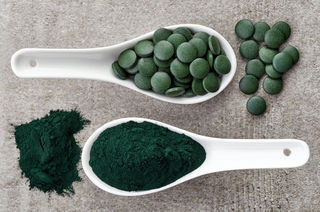
Source: baibaz/Shutterstock
But how do algae make it from the ocean to us? Algae farms like Qualitas Health in Texas are harvesting kilos of biomass to create a plant-based source of omega-3 fatty acids. A strain that starts in a beaker can eventually produce between 10,000 and 15,000 kilos of biomass per acre a year. While you can usually get the fatty acids separately from fish or supplements, Qualitas is growing a genus of algae that blends both of omega-3’s two essential fatty acids together, according to Longview News-Journal.
Spirulina, a well-known type of algae, is rich in some nutrients that aren’t found in the typical daily multivitamin. According to the FDA, spirulina contains significant amounts of calcium, niacin, potassium, magnesium, B vitamins and iron. It also has essential amino acids, which are the building blocks of proteins. In fact, protein makes up about 60 to 70 percent of spirulina's dry weight.
What’s more, in a 2008 study in the Annals of Nutrition and Metabolism, researchers found that people who took 8 grams of spirulina supplements daily for 16 weeks experienced lipid-lowering effects and significant reductions in cholesterol.
While the National Institutes of Health recommends researching the source of spirulina in supplements to ensure they are grown in safe conditions and tested for toxins, if harvested the right way, algae can be one of the most eco-friendly and sustainable foods you can find. With algae-sourced nutrients, you’re not tapping into already overfished marine ecosystems. In addition, acre for acre, harvested algae produces much higher protein levels than beef, milk, wheat, and soy.
Hydroponically grown algae like ENERGYbits requires less space per cubic centimeter and delivers more nutrients per acre than any other crop. The omega-3 found in ENERGYbits is safer than fish oil, and it’s vegan and doesn’t go bad like fish oil can. In addition, people with shellfish allergies or dietary restrictions on animal products can get their omega-3 from algae instead.
Scientists are still studying the bioavailability of nutrients in individual foods, or how much the body absorbs these nutrients, as well as how they work to help prevent disease. So it’s important to combine algae with a healthy diet to see the most nutritional benefits, as the nutrients from the food and algae will work in synergy, which will increase their bioavailability.
Click Here For More Articles
Don't forget to opt-in to Our Healthy Living Society and get 3 free gifts while receiving the latest information on health, well-being and groundbreaking news about natural nutrition.

No comments:
Post a Comment